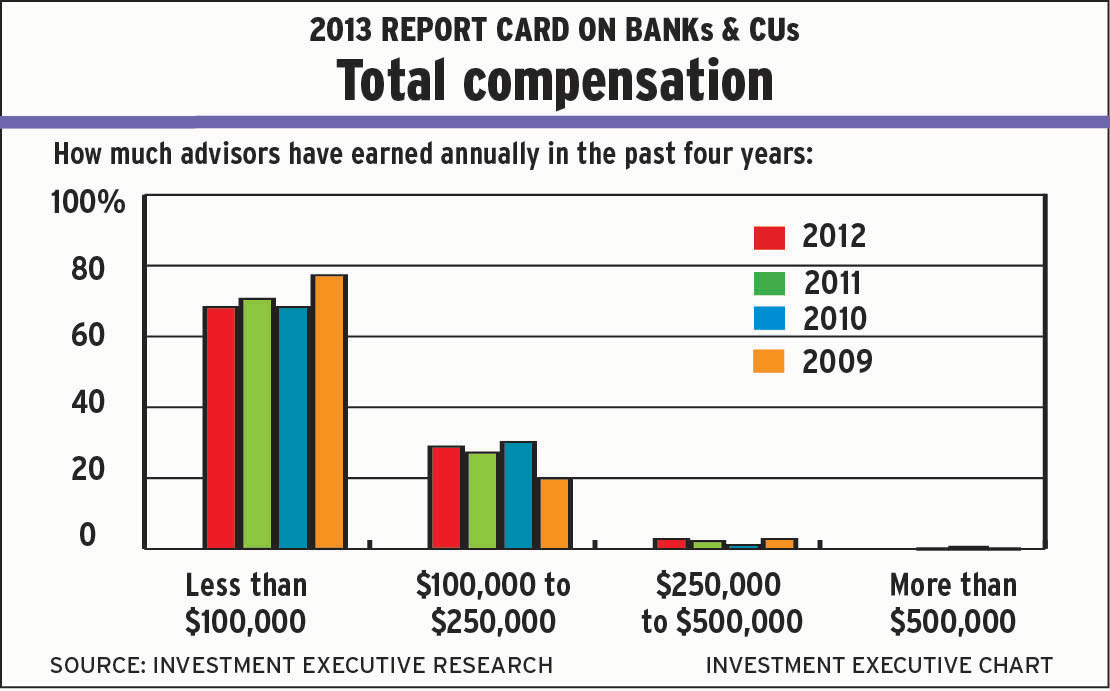
Financial advisors surveyed for this year’s Report Card on Banks and Credit Unions reported growing dissatisfaction with their firms’ compensation practices – either because their firms have made underwhelming changes to their compensation programs or because the pay does not match advisors’ level of expertise.
In particular, the average overall performance rating in the “firm’s total compensation” category dropped to 7.5 from 8.0 year-over-year, with four of the firms in the survey – Canadian Imperial Bank of Commerce (CIBC), Royal Bank of Canada (RBC), TD Canada Trust (all based in Toronto) and Edmonton-based Servus Credit Union Ltd. – seeing their performance ratings drop by half a point or more.
In addition, advisors rated their compensation a lofty 8.8 on average overall in importance, resulting in a “satisfaction gap” of 1.3 points between the overall performance and importance ratings. This gap is notable, being tied for the third-largest such gap in the survey this year, which means that advisors’ expectations are far from being met.
“They keep changing how bonuses are done every single year,” says an advisor Ontario with RBC, which received a rating of 8.0 in the compensation category – the highest in this year’s Report Card for this category, albeit down from 8.6 in 2012.
Adds a colleague in the same province: “They have restructured [the compensation program], taking a lot away from some categories and adding a little bit to the bonus side. It works out to be about a 20%-25% – or $45,000 – annual decrease [for me].”
According to Michael Walker, vice president and head of branch investments with RBC: “There were some changes around the bonus.” In particular, he says, RBC’s bonus structure is based on three factors: the size of the advisors’ book of business; the growth of the book over the year; and the products the advisor sells.
“The mix of compensation among those three things is what has changed in 2013,” Walker explains. “We adjusted our financial planners’ bonus compensation to provide greater recognition for growth in the depth and breadth of their client relationships. The actual bonus amount would be dependent on the specific financial planner’s performance.”
This trend isn’t exclusive to RBC. Advisors with CIBC, which saw its rating in the compensation category drop to 7.1 this year from 7.7, also reported dissatisfaction with changes to their compensation.
Says a CIBC advisor in Ontario: “It’s gotten worse over the past five years. They change our compensation halfway through the year. Bonuses are based on revenue and other targets, [but] they’ll change the bonus halfway through the year.”
However, Larry Tomei, senior vice president, national sales and service, retail and business banking, with CIBC, sees things somewhat differently: “We have a strong compensation program in place for our advisors. [And ] when we make adjustments to compensation, our focus is to ensure our compensation program remains highly competitive and that our advisors are in a position to improve their compensation by meeting the broader financial needs of their clients.”
Montreal-based National Bank of Canada is another firm that made changes to its compensation structure that were not well received by advisors. They gave the firm a 7.6 rating in the category, down from 7.9 in 2012.
Says a National Bank advisor in Ontario: “I’d like the salary to change, [but] they’ve made changes to how the bonus structure is calculated instead.”
Such changes were necessary, says Annamaria Testani, vice president, national sales, intermediary business solutions, with National Bank, “because compensation is something that is forever evolving. You don’t do compensation and not touch it for 15 years because, along the way, it doesn’t do what it’s supposed to do. Compensation really is a tool to guide the behaviour you want.”
Regardless of the recent changes that firms may or may not have made to their compensation structures, advisors across the board said that the deposit-taking channel needs to do a much better job regarding advisors’ pay.
“There isn’t enough compensation for the role, the level of responsibility and level of education required,” says an advisor in Ontario with St. Catharines, Ont.-based Meridian Credit Union.
A CIBC advisor in Ontario agrees: “We’re not compensated in line with the jobs that we do.”
That frustration was evident in the numbers that advisors reported this year. On average, advisors have larger books of business this year, at $57.3 million vs $46.4 million in 2012; yet, compensation has not increased at anywhere near the same rate.
In fact, 68.3% of advisors surveyed reported earning less than $100,000 a year, vs 70.6% of advisors who earned the same amount in last year’s survey. As well, the percentage of advisors making between $100,000 and 250,000 annually rose to 28.9% from 27.2%, while the percentage of those earning between $250,000 and $500,000 rose to 2.8% from 2.2%.
As a result of this dissatisfaction, some advisors are moving on to pursue more lucrative opportunities elsewhere. “Better pay is important,” says a TD advisor in Alberta. “I find that there is a lot of turnover, and clients complain that they jump around from advisor to advisor. The turnover is because we are not compensated enough for the work that we do.”
© 2013 Investment Executive. All rights reserved.